Students Learn Innovation, Iteration with Tim Gunn, Industry Experts
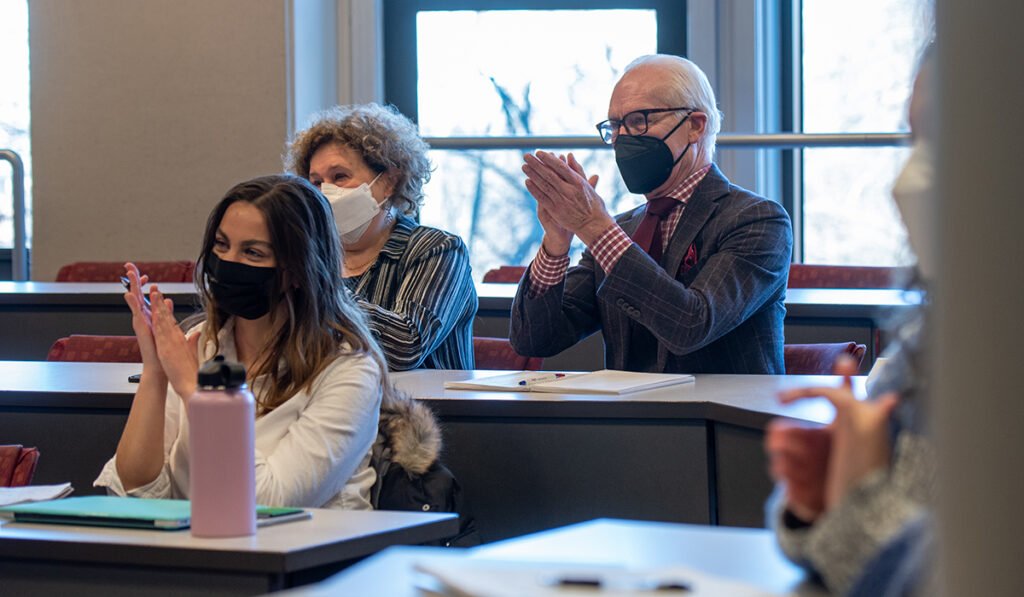
Leeah Derenoncourt ’23 knew from her work with Generation Ratify, a youth-led movement to ratify the Equal Rights Amendment, that young activists need people to help them promote their cause so they can focus on organizing and doing the work. Then, last summer, during a trip to Ireland on a Frederick Douglass Global Fellowship, she was inspired to think about the different ways she could effect change.
But it wasn’t until she took Innovation for Impact, a four-credit winter term class taught by Sharon Topper, affiliated faculty in Marketing Communication, and TV mentor, writer, and educator Tim Gunn, that Derenoncourt learned how she could synthesize her ideas and ambition and turn them into an actual business.
Agitate, named for Douglass’ advice to a young Black man, is a public relations agency serving youth social impact groups.
“When I started the class the idea was just an idea,” Derenoncourt said. “I started doing research and I started the beginnings of how exactly I could make it a reality (prior to Innovation for Impact), but … in the class I really learned the concrete steps I needed to make it a reality.”
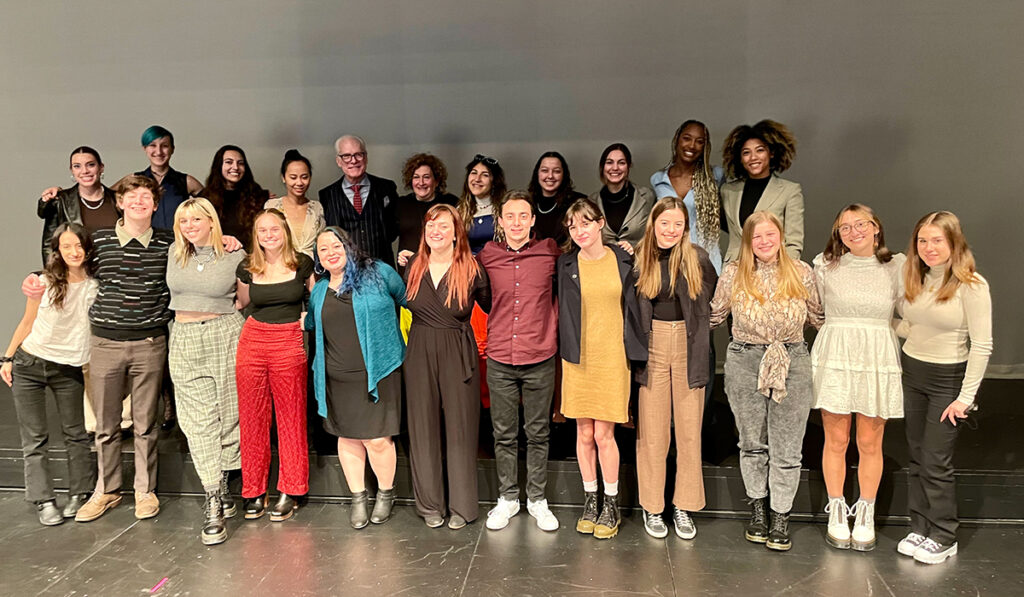
Derenoncourt was one of 23 undergraduates from a wide spectrum of majors who spent 10 days in December and January learning from Topper, Gunn, faculty and experts from across various industries, and from each other. Their goal: Turn an idea to promote social good into a viable service or business.
“The thrill for Sharon and me has really been to watch these ideas evolve, and this week, we’re seeing them all come from the ether into something tangible that you can hear and view, and in some cases, even touch,” Gunn, of Project Runway and Making the Cut fame, said prior to the January 7 final presentation of projects. “It’s been quite thrilling to see the full circle.”
Watch: Innovation for Impact Final Presentations
Each student applied to the course with an idea they wanted to develop. It could be any kind of business, service, organization, or product in any field or industry, as long as it addressed some need or improved life for others. Throughout the class, students learned about business models and business plans, how to monetize a venture, how to find audiences and collaborate with partners, ways to market their ideas, and even some copyright law.
Some, like Derenoncourt, brought in ideas rooted in personal experience and had a strong sense of where they wanted to take their concept. Others came in with less background in developing an idea.
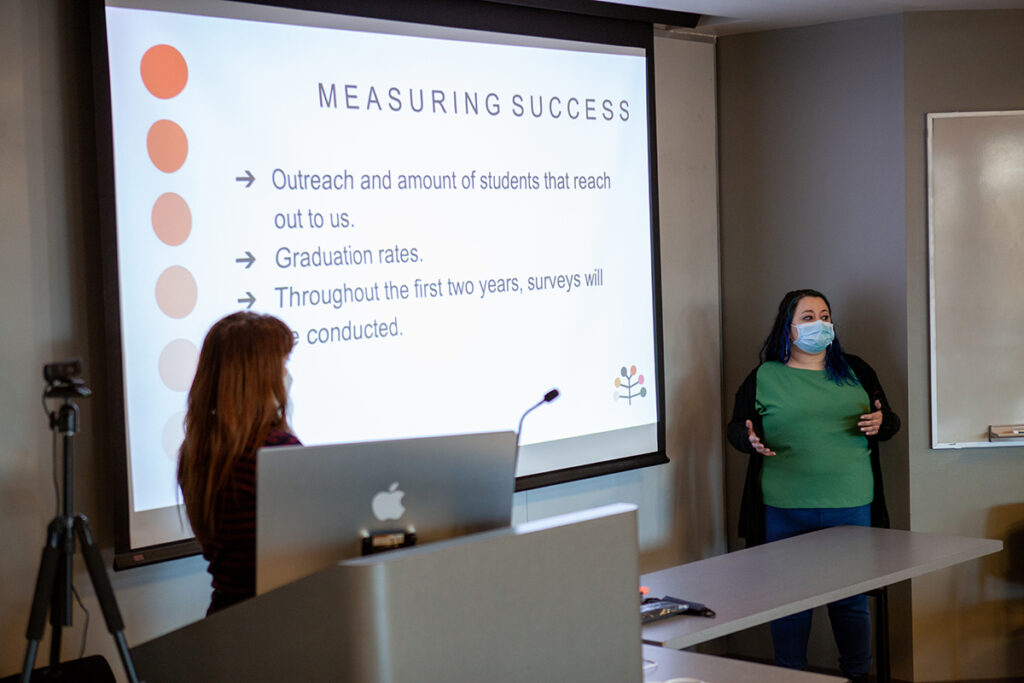
“In some ways … the students who had no experience with their idea, they were freer to fly and take big risks,” Gunn said. Those who had more of a complete picture of what they wanted were in some ways more challenging to work with, he said, but they too began to think beyond their own rubrics.
“Or relaunch [ideas] in some cases,” Topper added. “[We thought] how can we take this idea and make it bigger? How do we add purpose to it to really access their passion for why they’re doing this in the first place?”
Topper said in many ways, the class itself was its own Innovation for Impact startup.
“We’re adding something to humanity by bringing these wonderful ideas into the world with our students who are our future, and I feel like we’re in good hands.”
Helping Topper and Gunn shepherd these ideas were a dozen guest innovators from within Emerson and from the outside world who shared their experiences with students and gave valuable feedback.
There was something for every flavor of idea at every stage of the game. Buck Sleeper, head of retail experience consulting for EPAM Continuum, a Boston-based business and design consultancy, spoke about human-centered design. Maria Velissaris, founding and managing partner of SteelSky Ventures, talked about getting funded. Betsy Smith, president of social media agency Allin.Smith, shared her expertise in promotion.
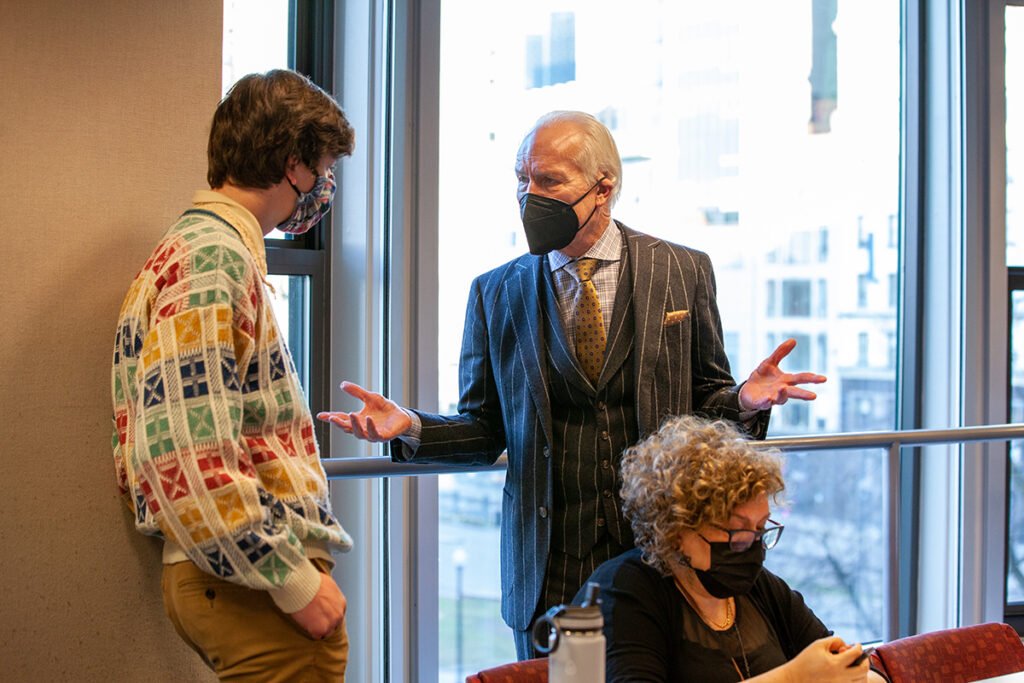
Nathan Manaker ’23, founder of the Common Ground Initiative, a student organization that facilitates conversations between students from different ends of the political spectrum in order to promote peace and understanding, called the guest speakers “incredible.” Sleeper gave Manaker some really solid advice on the structure of his org’s meetings, and Eric Schwarz, co-founder and CEO of College for Social Innovation, shared “totally invaluable feedback.”
“Bhamati [Viswanathan, a corporate and intellectual property lawyer and Emerson affiliated faculty member], is just incredible … and I had so much fun hearing her feedback and hearing her talk about copyright and the legal implications of our work,” Manaker said.
Many of the guest speakers also served as judges for the class finale, held January 7 in the Semel Theater and online. To cap off the class, students, organized into tranches based on project sector (Communications & Community; Arts; and Health, Wellness, and Beauty) made their pitches and presented their business plans for the judges, who gave final feedback.
A huge part of the magic of the course was the sense of collaboration and camaraderie that developed between the students. Rather than competing with each other or keeping their ideas under tight wraps, the students shared input and solutions freely, trading skills and expertise to ensure that everyone’s project was as good as it could be.
“I think we all realized very early on that we all came with different skills and different strengths, and if we all worked together, we’d accomplish more than if we just stayed in our lanes,” Derenoncourt said.
That support system was Manaker’s favorite part of the class.
“You’ve got two experienced professors, one of whom is a celebrity, and then you have a bunch of students … and everyone had a story they were trying to tell,” he said. “Ultimately, what ended up happening was we were able to help each other tell our stories and really support each other and really lift each other up.”
“Students are really helping themselves so profoundly,” Gunn said, “it’s actually quite moving to watch.”
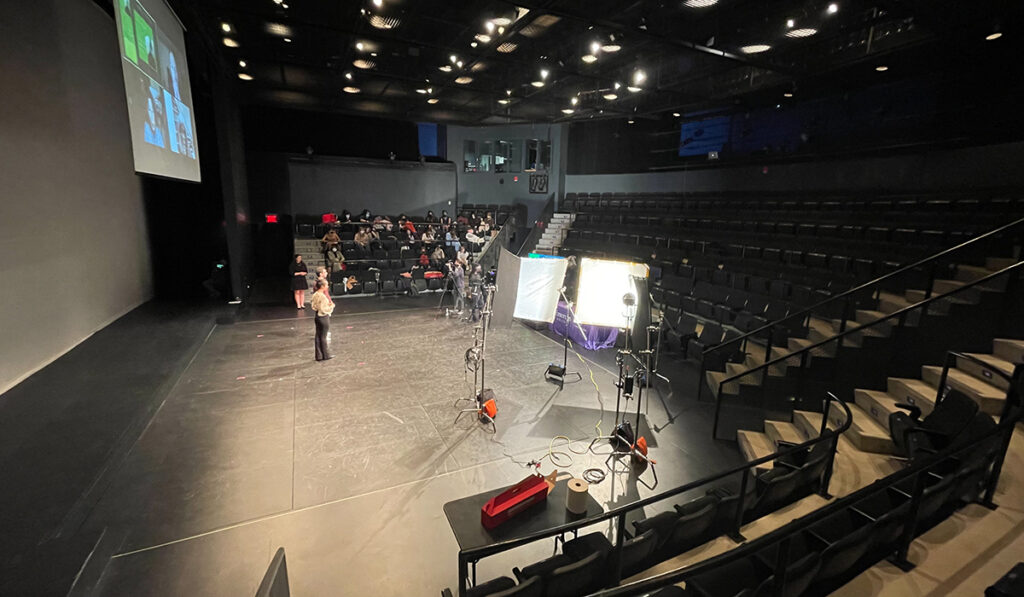
Now that the class has ended, Manaker and Derenoncourt plan to keep working on their ideas and bring them to fruition. Derenoncourt said she will continue to work on her organizational structure and plans to meet with entities who can support Agitate, either monetarily or otherwise, with hopes of launching inside of a year.
One team in class announced during the finale that they had their first client. Kasey Douglas ’23 and Ainslee Macquarrie ’23 created ArtPath, an affordable, interactive classroom museum experience, told the judges that they have an order for 100 art kits tailored to an upcoming exhibit at the Fuller Craft Museum in Brockton, Massachusetts to be used in a Brockton elementary school in October 2022.
“I introduced them to someone I know at Fuller Craft Museum to have a conversation, vet their idea,” Topper said. “They came back to us that day to say not only do they love the idea, but they want to get started. By the end of this class they have their first pilot program, and that is amazing.”
And do Topper and Gunn have the proof of concept they need to run the class next winter?
“In a heartbeat,” Gunn said. “We plan to be back.”
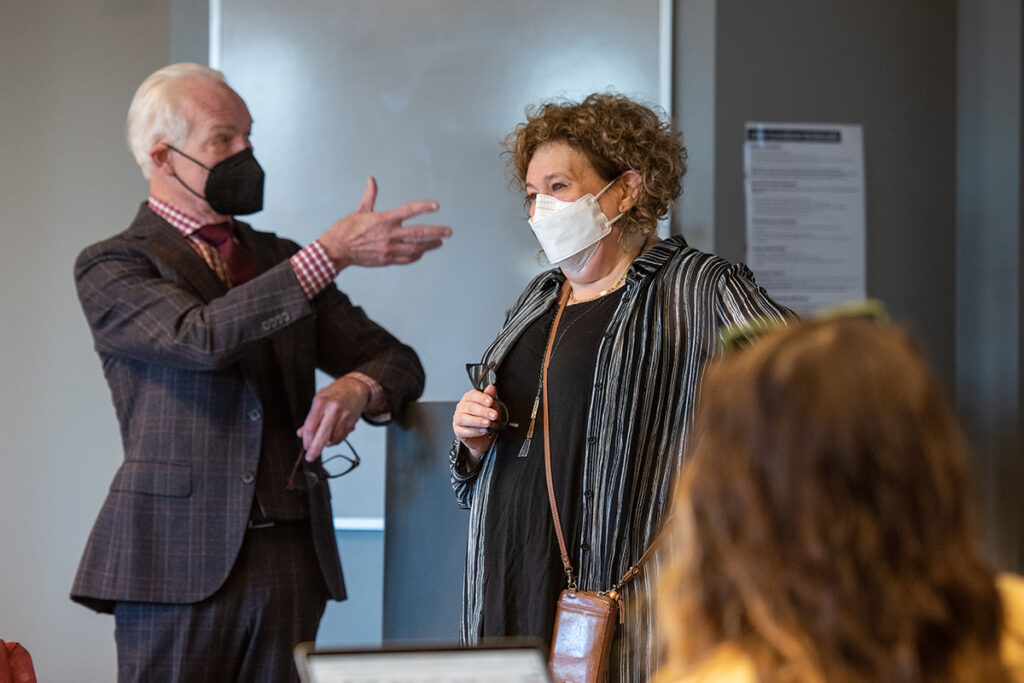
Students and Solutions
Natalia Arbulu ’23 (Creative Writing)
Vivid — A platform to connect artists in Latin America with buyers outside the region
Eva Charbonnier ’23 (Marketing Communication)
The Alley Cat –An artist collective that promotes and facilitates guerilla and commissioned public art
Esther Dashevsky ‘25
Done — Software that helps children and adults draw, regardless of ability or experience
Leeah Derenoncourt ’23 (Public Relations)
Agitate — A public relations agency supporting youth social impact and advocacy groups, pro bono
Kasey Douglas ’24 & Ainslee Macquarrie ‘23 (Marketing Communication)
ArtPath — An affordable, interactive museum experience for the classroom
Alexis Edmonds ’23 (Business of Creative Enterprises)
Hairavan — The only Black-owned mobile beauty supply store
Briana Figarella ’23 (Media Arts Production) & Gretta Prostak ‘25
The Growth Collective — Providing resources and support to the non-traditional college student and student-parent
Kristin He ’24 (Political Communication) & Mike Rubenstein ’22 (Public Relations)
Moodcomm — A mental health app that helps users articulate emotions
Jillian Hetherman ‘25
Gynaìka — Innovative women’s health center with patient-centered approach to care, diagnosis, and appointments
Emily Hughes ’24 (Communication Studies)
Forgetmenot — An organization that uses flowers and flower assembly to connect with those with memory loss
Cordelia Kelly ’24 (Business of Creative Enterprises)
Dragon Tongue — A gaming company dedicated to building connections and breaking down language barriers between people around the world
Rose Luczaj ‘25
Mindlink — Social media platform and safe space to share art and work toward destigmatizing mental illness
Alison Madsen ’24 & Susie-Jane Wilson ’24 (Business of Creative Enterprises)
Rotation Station — A service providing affordable, curated second-hand clothing for children and the planet
Nathan Manaker ’23 (Marketing Communication)
Common Ground Initiative — An organization that brings students together from across the aisle to have meaningful conversations
Abby Matzke ’23 (Media Arts Production)
FilmSense — A nonprofit created to supplement skills and knowledge of the film industry
Francesca Polistina ’22 (Marketing Communication)
ArtSync — A streamlined platform for artists to connect and sell locally
Emma Vignola ’23 (Marketing Communication)
Iridescence — A company that produces unique earrings to instill confidence
Henry Wachs ‘25
Inner Strength — Helping women feel the best they can while undergoing chemotherapy
Lauren Wantland ‘25
Hair Share — An app that helps people find the best haircare product for them.
Guest Speakers
Asaf Bitton, executive director, Ariadne Labs; assistant professor, Harvard Medical School
Ben Chesler, co-founder, Imperfect Foods
Stacey Gallaway, founder and managing director, Gallaway Consulting Group
Michael Kaye, chief design officer, Sylvain
Stanley Miller, senior executive-in-residence, Business of Creative Enterprises, Emerson College
Andy Minkstein, principal and co-founder, Lamplighter Ventures
Lu Ann Reeb, senior executive-in-residence, assistant dean of School of the Arts, and director of Business and Entrepreneurial Studies, Emerson College
Eric Schwarz, co-founder and CEO, College for Social Innovation
Buck Sleeper, head of retail experience consulting, EPAM Continuum
Betsy Smith, president, Allin.Smith
Maria Velissaris, founding and managing partner, SteelSky Ventures
Bhamati Viswanathan, corporate attorney; affiliated faculty, Marketing Communication, Emerson College
Judges
Sabrina Horn, advisor and speaker; bestselling author, Make It, Don’t Fake It
Michael Kaye
Andy Minkstein
Sanjay Pothen, director, Emerson Launch
Lu Ann Reeb
Eric Schwarz
Brent Smith, professor and chair of Marketing Communication, Emerson College
Buck Sleeper
Amy Stuehler, president, Optimum Revenue Consulting; executive-in-residence, Marketing Communication, Emerson College
Bhamati Viswanathan
Categories